Is gin facing a botanical crisis?
Botanicals are an essential element of making gin. But for producers, gathering enough of them can be a tricky proposition, especially when suppliers are in war zones, or the plants are rare.
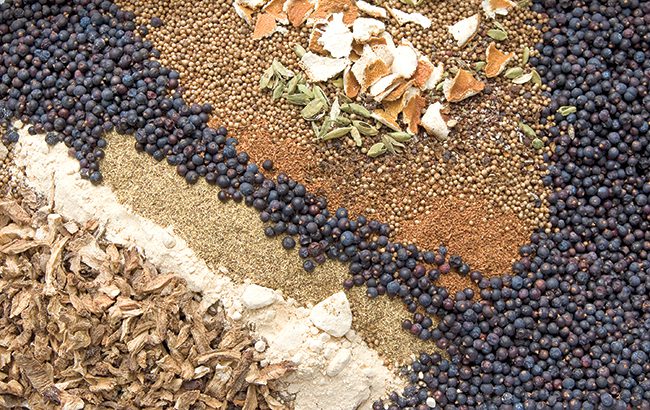
*This feature was originally published in the July 2024 issue of The Spirits Business magazine.
A fundamental element in every gin is the botanicals – from juniper and coriander seeds to the fruits and flowers that can only be grown in certain regions.
Over the past decade, as the gin category has boomed, the botanicals market has seen demand soar. According to S&P Global Market Intelligence, UK imports of botanicals used in a wide range of gins (cinnamon, nutmeg, coriander and liquorice) rose by 9% annually between 2017 and 2022, led by a rise in shipments of cinnamon and coriander seeds. However, S&P has seen signs of a slowdown, with a 3% decline in the 12 months to 31 August 2023, compared with 2022.
This is perhaps in line with gin’s decline in the UK – data from IWSR Drinks Market Analysis reported a 14% drop in gin volumes in the country in 2023.
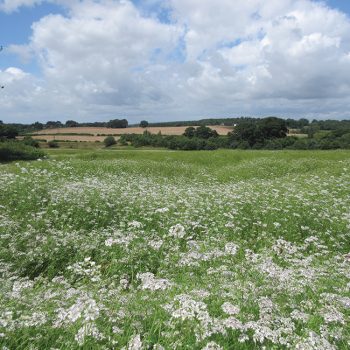
The impact of this decline is being felt by UK-based botanical supplier Beacon Commodities, which has seen a drop in demand, says owner and managing director Tommy Haughton. “It’s probably been down for coming up to 12 months now. I would say it’s similar on the export side, although probably not as extreme as in the UK.” However, he is more positive about the opportunities internationally. “There are still countries that are discovering and starting to make gin, having never made it before, and therefore you could argue that we’re getting more demand and more export shipments out to those new countries, such as in South America, Asia, Vietnam, Cambodia, Thailand. Japan seems to be busier than ever.”
He adds: “I’d say nearly the whole world has now discovered gin, 10 years behind the UK. They were just drinking the major brands, and now little craft distillers are setting up and starting to ask for botanicals.”
While the UK is the company’s most important market, where it supplies to major conglomerates such as Diageo and Bacardi, Haughton says the “export side has grown significantly in the past five years”. Other key markets for the company are Australia, South Africa, Japan, Spain, France and Canada.
Despite declines in the key gin markets of the UK and Spain, the category is finding favour with drinkers internationally. In 2023, the gin category saw “very strong growth” in markets such as Africa (particularly Nigeria), the Philippines, Russia, China, and India, says Chris Pitcher, partner at Redburn Atlantic, at the recent Ginposium conference in June. There is also an “opportunity for growth” in European markets, such as Italy, and the US.
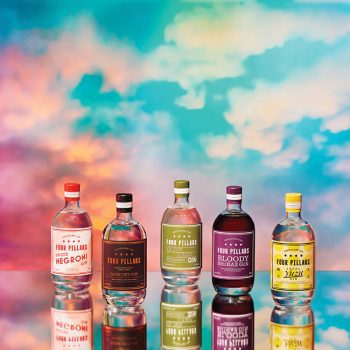
Beacon Commodities also supplies botanicals to Australian producer Four Pillars, including juniper from Macedonia and Serbia. Last year, Four Pillars bought 50 tonnes of juniper, as well as angelica and cubeb. As well as its regular supply from Beacon, Four Pillars also sources botanicals locally, explains head of production Sarah Prowse. Among them are lavender, citrus, finger limes, lemon myrtles, Tasmanian pepperberry, and wattleseed. “It obviously makes sense to buy Australian products, especially after that ship got stuck in the Panama Canal,” she says. “I think we got down to about 100 kilograms of juniper, which is about a day’s distillation. So we had two boats sitting on the water. And that was a really big wake-up call that we need to source locally to avoid those sorts of issues, if there was ever a war or, you know, things just happen, and you can’t get botanicals from overseas.” During Covid, the cost of shipping “tripled overnight”.
However, Prowse says juniper is tricky to get close to home. “Juniper is something that we will probably never be able to buy locally. I think there are a couple of tiny farms in Australia. But we’re never going to be able to grow the volumes that we need.”
Local ingredients
Sourcing local ingredients is an important element at English distillery Silent Pool, based in the Surrey Hills on the Albury Estate. The gin is made using a blend of botanicals inspired by the indigenous florals in the village of Albury, including local lavender, camomile, elderflower and linden. “The majority of our florals are UK-grown so we work with a nice place in Somerset that grows pretty much the majority of our range,” explains distiller Harry Keene. The company also uses local honey, sourced from hives directly behind the distillery.
“We’re planning for more hives next year. We’re looking to hire an apprentice beekeeper who will work with our current beekeeper as we keep growing to keep our local honey source, and keep up with demand,” says Rhian Billington, global marketing director at Silent Pool Distillers.
Keene finds that overseas juniper is “very easy to source” due to the UK being a massive hub for gin production. The brand also launched its limited edition Black Juniper Gin, created with rare black juniper berry, which only grows above 4,000 metres in the Himalayan Mountains, which was hand foraged during a “very short window”. The company also worked with the Rare Tea Company, which provides rare teas for Black Juniper Gin, including cloud tea and Nepalese cherry blossom, which comes from a single tree harvest each year.
At Beacon Commodities, Haughton says there are several botanicals that are a challenge to work with, due to issues such as climate change, geopolitical volatility, or shipping. “It now seems to be two or three or four that are a problem every year,” he explains. The situation is then exacerbated by the high demand for botanicals. “It’s quite cyclical because, say, the coriander price goes through the roof. Farmers grow coriander the next year, and suddenly there’s a complete deluge on the market, and the price drops significantly.”
Juniper supply was straightforward in 2023 but he says reports indicate “it’s definitely worse than last year. Juniper is always universally difficult, probably because it’s so important. It’s so important to get the quality right, the price right. There’s the age-old question about supply and demand, you don’t want to overbuy. We’re sort of having to buy before the orders start coming in. So there’s a lot of guesswork.”
Speaking at Ginposium last month, Stefano Trumpy, managing director of botanicals supplier Webb James, foresees “very high sales for juniper” next year. “I’ll buy a huge quantity and maybe in two years I won’t buy the product, and buy very low quantities.”
One problem has been with sweet oranges, says Beacon’s Haughton. “The availability of fruit is significantly lower, and that’s a bounceback from California.”
According to the US Department of Agriculture, Florida’s orange production has been affected by two phenomena – greening disease and hurricanes.
Russia’s invasion of Ukraine also had an impact on coriander supply. “We used to buy Ukrainian coriander seed, and Russian. We made a company decision to stop buying Russian and we couldn’t get the Ukrainian stuff.” Instead, coriander is now being purchased from Bulgaria, and Beacon also now has 36 hectares of coriander growing in the UK, Haughton says.
One benefit of botanicals is that they are dried goods. “We are lucky that these things don’t tend to have a shelf life, and they’re non-perishable. So they can be stored for 12 to 24 months easily,” Haughton adds.
Sourcing challenge
Sourcing English angelica root is also a challenge for Silent Pool. “It’s very hard to come by; it’s quite a challenging source even though its’s a UK-based one, but we have to work directly with farmers who grow for us, and we tell them how much to plant a year,” Keene notes. He also says there were some “big price hikes two years ago”, citing the high cost of grain from Europe.
Islay gin brand The Botanist has also seen an increase in the cost of raw materials in the past few years. “We haven’t had any supply issues for the nine core botanicals but we have made the decision to ensure we have dual supply in case of that eventuality,” says Katie Smith, global brand manager – communications, The Botanist Islay Dry Gin. “The 22 hand-foraged botanicals were selected for both their flavours and aromas, but also because they were commonly found on the island – a few of them are even considered weeds. Only one of them is rare or endangered (of which we only use a symbolic sprig) and we use a specially created geographic information system to map the botanicals’ population health.”

At Bacardi, the company’s master of botanicals, Alessandro Garneri, leads the group’s global botanical centre in Geneva, Switzerland. He manages 110 botanicals that are sourced from all over the world to make products such as Bombay Sapphire gin and Martini vermouth. Bombay Sapphire’s blend is made with 10 botanicals, half of which come from Europe and the rest from tropical climates, he explains. “One botanical that is more tricky is juniper, which I’m watching with a close eye. It’s the key ingredient, and a wild ingredient. It’s dependent on weather,” he explains. Each botanical goes through a sensory evaluation with a panel of eight people at the Geneva site to ensure its quality.
Garneri highlights that one quality issue for juniper is the chemical compound TCA (2,4,6-Trichloroanisole), otherwise known as cork taint, which is an off-flavour that can affect products, mainly wine, as well as spirits. TCA can be found in juniper berries or other botanicals, Garneri says. “We have tried over the years to find a solution to correct the problem; we’ve tried everything.” He cites the importance of “working preventatively with the suppliers, in the field, during the harvest, with good manufacturing practice and good storage practice”.
Sourcing botanicals sustainably is also of increasing importance to suppliers and brands. At Beacon, Haughton said it’s a challenge because botanicals are sourced all over the world and are brought to the UK. He explains that crops have been under a lot of pressure, and a “slight slowdown in demand is not a bad thing”, adding it “might bring prices down a little and get people to concentrate on quality”.
Silent Pool’s Keene adds: “One of our suppliers is organic and B Corp-certified. Another one is also B Corp-certified and our third one is working towards it.”
Foraged by hand
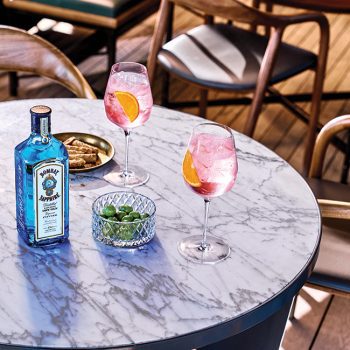
Meanwhile, at Bombay Sapphire, eight of its botanicals have been certified as being sustainably sourced according to the For Life standard. The Botanist’s Smith also says the nine core botanicals it uses are Fairtrade-certified, and 22 botanicals are sustainably foraged by hand (mint, camomile, heather, and clover are among them).
In terms of the spice sector, Webb James’s Trumpy noted in his Ginposium seminar that there has been a huge demand for Nigerian ginger. But because of floods and disease, Nigeria has not been able to produce any ginger, even for the domestic market, he says. In terms of solutions, businesses have to look at flavour and taste profile alternatives “rather than focusing on origin”, he explains. From his experience, “being flexible in R&D for alternative sources is important; the aromatic profile is more about territory, climate and seasonality than a specific origin”.
Juniper is the most important ingredient in gin so demand for the botanical has been fairly strong. “There’s such a high demand,” says Haughton.
“And with that comes some cowboys to the market trying to sell poor-quality juniper. Juniper has been under pressure to produce lots and lots of quality and quantity over the last five years.
“This is the first proper slowdown we have seen in gin botanical demand for 10 years. If anything, it’s going to be a good thing for juniper trees to recover.”
What challenges have you found with working with certain botanicals, and how did you address them?
Tasso Ferreira – general manager and co-founder, Seventy One Gin
“Sourcing the best and harvesting at their best time is the most challenging and exciting part of working with botanicals at Seventy One. In June, for instance, we celebrate the most anticipated time of the year for us: the blooming and harvest of the Queen of the Night cactus flower. One night a year, when at its pinnacle, Selenicereus Grandiflorus blooms ephemerally, before delicate hand-harvesting at the zenith of darkness, when its fragrance is at its pinnacle before individual distillation to achieve its absolute. Cultivating the Queen of the Night is an art that demands passion and patience, achievable only with the help of a team of botanists who grow them with passion and precision, exclusively for Seventy One.”
Myriam Hendrickx – master distiller, Rutte Gin
“Some botanicals are harder to find, and are becoming increasingly expensive, for example sloe berries. But sloe gin is a small product for Rutte and only for sale in the Netherlands. For Rutte Dutch Dry Gin, which is internationally available, a couple of years ago we went from regular botanicals to organic when we moved to the current bottle. The transformation was easy. Here and there we had some very slight differences in taste. Not better or worse, just different. The taste gets influenced by the country of origin. Juniper tastes different whether it comes from Italy or Macedonia, for example. We use fresh oranges that we peel by hand. Organic oranges are harder to peel. The peels are thinner. We don’t mind that we have to work a bit harder, as long as we have an optimal quality.”
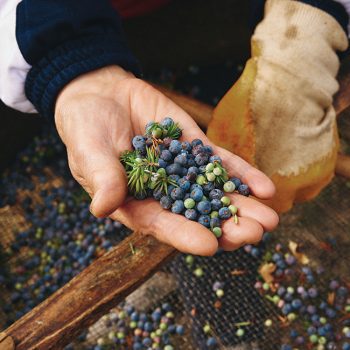 Damola Timeyin – co-founder, Spearhead Spirits
Damola Timeyin – co-founder, Spearhead Spirits
“The revered baobab fruit is central of all of our Bayab Gin expressions. The baobab tree is sacred in Africa, and its fruit has a bold, refreshing flavour profile. Our challenge has been how to tell the story of the baobab fruit on the world stage, and also protect and preserve its future. If you’ve never heard of the baobab tree, you would have seen Rafiki sitting in it in the film The Lion King. This is why we have partnered with Ho Technical University, joining like-minded partners to fund a baobab research-and-regeneration project. The pioneering research we’re supporting will result in us planning a million baobab trees in 10 years.”
Katie Smith – global brand manager, communications, The Botanist
“The only rare botanical of the 22 that we use is juniper from Islay. Juniper would have been found in abundance on the island hundreds of years ago, but its use in illicit distilling (it burns without smoke) and grazing by the island’s sheep and deer have pushed this fragile plant to the edge. Our two full-time foragers, James Donaldson and Kate Hannett, instigated a propagation programme to seek out the plants, take cuttings, nurse them, and when the time is right, plant them back into the wild. We add a symbolic sprig of this to each distillation of The Botanist to highlight its plight.”
Charnelle Martins – head distiller, Third Eye Distillery
“One significant challenge in working with certain botanicals, particularly coriander, involves maintaining consistent flavour profiles. Coriander seeds, an essential base botanical for Stranger & Sons Gin, exhibit varied flavour profiles depending on their level of drying after they have been harvested. Lightly dried seeds possess a green herbaceous flavour, whereas well-dried seeds impart a delicate citrusy note. To manage this variability, we collaborate closely with local spice vendors who sort the coriander to meet our specific preferences. Given the fluctuating temperature and humidity in India, we mitigate the risk of flavour degradation and contamination by procuring botanicals on a weekly or monthly basis as required, thus avoiding prolonged storage. Our dedicated botanical storage room is equipped with temperature and humidity controls to ensure optimal preservation conditions. Each batch of botanicals undergoes rigorous testing for visual quality, aroma, and taste. The taste test involves a steeping technique, akin to making tea, where a measured quantity of the botanical is steeped in hot water. Any batch that fails to meet our specifications is rejected. These pre-distillation steps are crucial in minimising botanical flavour variations in the final product.”
Eric Sampers – global marketing director, Brockmans Gin
“We are called the ‘properly improper gin’, and it is part of Brockmans’s DNA to develop recipes that use unusual ingredients. The original’s recipe incorporated dark berries as early as 2008. Orange Kiss is made with Valencia oranges and triple sec, and in the case of Agave Cut, we blended gin with agave spirit and pink grapefruit. With this last example, we had to drop ‘gin’ from the packaging as the final liquid is made of two different spirits categories, and although it retains some of the key organoleptic characteristics of a gin, it is classified as a ‘spirit drink’ in the UK and Europe and a ‘Distilled Spirits Specialty’ in the US, which no consumer understands. Regulations can be quite limiting when it comes to innovation, but consumers eventually identify and buy into a brand proposition, not into theoretical rules. We have sold out the first batch of Agave Cut, very quickly and are already producing the new one.”
Jon Hillgren – founder and master distiller, Hernö Gin
“Working with botanicals can present unique challenges. For instance, some botanicals have delicate flavours that can be easily overpowered. To address this, we meticulously balance the quantities during distillation. When it comes to the key botanical in gin, juniper berries, we are looking at a certain level of oils as well as how the berries have been treated post-harvest. Another challenge is seasonality. Weather, climate, and local conditions might vary in different years, but maintaining consistency in taste is crucial for us. We conduct rigorous testing and quality control to ensure that every batch of our gin meets our standards, making sure we deliver the same exceptional Hernö Gin taste every time.”
Mark Boswell – head distiller, The Secret Garden Distillery
“We grow a wide variety of botanicals for our gins, which can create logistical challenges in predicting future needs. We address this by holding regular meetings between our sales, garden, and production teams to ensure we have the necessary botanicals ready. Through our drying process we can store harvested botanicals for up to three years, allowing us to distil through winter and lower harvest years. When we started producing gin around seven years ago, we initially infused petals into the base liquid to provide colour and aroma. Our all-natural philosophy prevents us from using preservatives, so we were having a lot of issues with the colour fading, particularly when the bottles were exposed to sunlight. To get around this we’ve recently reinvented our core range as clear gins, separately distilling the petals to capture their essence then carefully blending this distilled water through the base gin to match the original flavour and aroma. This required a lot of experimentation but we’re happy with the finished results and have completely negated the colour-fading issue.”
Alexandra Alfaro – marketing director, Guatemalan Spirits
“Guatemalan Spirits’ gin brand, Xibal, is linked to Guatemala’s Mayan origins and its culture. The brand uses botanicals native to the Peten jungle in Guatemala and used by our Mayan ancestors in their daily endeavours many centuries ago, combined with more ‘contemporary’ botanicals that were introduced to the Guatemalan mainstream culture by the Spaniards during the ‘conquista’. The biggest challenge we have found is finding a constant supply of the botanicals that our Mayan ancestors used. Our brand essence is true to its Mayan roots, but the reality is that these botanicals are not currently used a lot in Guatemalan culture. We have overcome this challenge by working strategically with local producers, working closely together with them to enable them to sustain a constant supply of these botanicals with the level of high quality we require.”
Related news
The Botanist Distiller's Strength launches in UK
